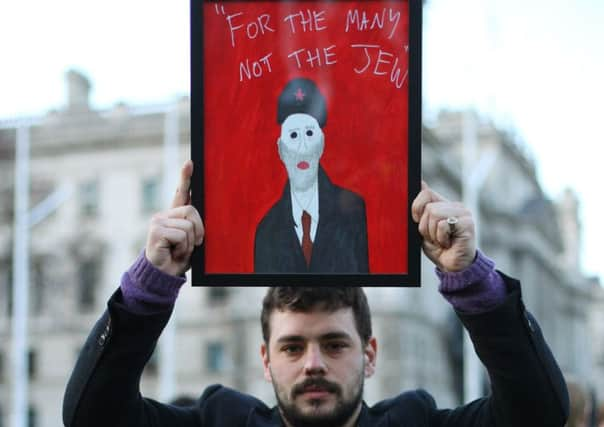Euan McColm: Anti-Semite shame of supporting Corbyn's Labour


This pair had been enthusiastic about standing for election under the Davidson banner and one had become a councillor last May, an eventuality he could not have contemplated just a few years ago. The pair view themselves as part of a new kind of Scottish Conservative Party, a natural home for political moderates.
Former Labour Party adviser Forde is a moderate, too, and his show is a hysterically funny howl of anguish about the degradation of politics. When he hit on the subject of the anti-Semitism scandal now engulfing his former party, his rage was palpable; Forde is no comedy-circuit Corbynista.
Advertisement
Hide AdAdvertisement
Hide AdAfter the show, conversation with my new acquaintances turned to the crisis in Jeremy Corbyn’s Labour Party. How, they wondered, could Labour members who were not anti-Semites honourably remain in the party? The previous day, the Board of Deputies of British Jews and the Jewish Leadership Council had jointly led a demonstration in Parliament Square against the inadequacy of Corbyn’s responses to repeated instances of anti-Semitism among the membership.
Wasn’t it time for men and women of honour to tear up their cards and abandon a party that had just been subjected to the utter shame of a demonstration against it by members of a minority that has been persecuted for centuries?
They had a fair point, I conceded. But what if the Scottish Tories were suddenly infiltrated and then taken over by the hard right, by ideologues espousing the most appalling views on race and sexuality – would they walk away or would they stay and fight?
Both said they would fight. Political parties are such crucial parts of the identities of those who join that letting go isn’t necessarily a simple matter of cancelling a direct debit. Those Tories would stay and fight if extremists took over their party and it is perfectly reasonable for Labour members to want to do the same.
Any member who remains but says nothing should be ashamed.
It is impossible to overstate the significance of last Monday’s protest in Parliament Square. When members of the Jewish community feel compelled, in great numbers, to protest against a political party, that political party has dangerously lost its way. If ever there was a time for some self-reflection, that was it.
Instead, too many of Corbyn’s supporters – on media social and traditional alike – indulged in some appalling whataboutery. Yes, went the line, there may be some anti-Semitism on the left but the real scandal was that it was being “weaponised” to attack Jeremy Corbyn. What contortions the faithful were willing to go through in order to protect the reputation – in which they have invested so much of themselves – of this man.
Even worse was a decision by Corbyn supporters to hold their own protest on Monday. These fools claim – despite countless pieces of evidence – that charges of anti-Semitism in the Labour Party are cooked up as part of a witch hunt against the leader and those loyal to him.
How badly damaged must one’s moral compass be that one thinks it’s acceptable to demonstrate against a group of Jews speaking out about the prejudice they endure? The twists and turns required to justify this hateful action are beyond me.
Advertisement
Hide AdAdvertisement
Hide AdIf Corbyn was serious about a zero tolerance approach to anti-Semitism, every member of the party who turned out to tell Jews they were wrong (or lying) about anti-Semitism would have been suspended by his Labour Party on Monday night.
If he truly understood – or cared about – the hurt caused by so many in his party, he’d have spoken out on Monday night to disown the counter-protesters. “Not in my name,” he’d have said.
Those who wish to remain in the Labour Party with any degree of honour must accept the truth that not only is Corbyn unfit to deal with the anti-Semitism that pollutes the Labour Party, his leadership enables it.
Two days after Monday’s protest, it emerged that the chair of Labour’s disputes panel, Christine Shawcroft, had intervened to try to overturn the suspension from the party of a Holocaust denier.
Because he had no choice, Corbyn insisted Shawcroft step down from the role. Soon, with grim predictability, Shawcroft issued a statement in which she said complaints about anti-Semitism were being stirred up to harm Corbyn.
Was Shawcroft really insisting that those Jews who turned out to protest about anti-Semitism in the Labour Party were part of some kind of conspiracy? Was she really using an anti-Semitic trope to deny a problem with anti-Semitism?
Belatedly Shawcroft bowed to the inevitable last night and resigned from Labour’s National Executive Committee, to be replaced by Eddie Izzard.
As this scandal raged on, Corbyn released a video message, marking Passover, to British Jews.
Advertisement
Hide AdAdvertisement
Hide AdIt was easy, he said, to denounce anti-Semitism when seen in other countries or political movements but “sometimes harder to see it when it is closer to home”.
What nonsense. It’s not hard at all to see anti-Semitism in the Labour Party. It’s not difficult to spot anti-Semitic imagery in murals, it’s easy to agree that Holocaust denial is wrong, and there should be no problem in denouncing anyone who continues to assert that this issue is about undermining Corbyn.
Corbyn, with his history of associating with extremists and anti-Semites, has no moral authority on this matter. His leadership has been reluctant, at best; his repeated failure to grasp the seriousness of the problem has helped create a counter-narrative among his supporters that basically says “the Jews are at it again”.
It surely takes strong stomach or a weak mind to remain a Labour Party member these days.
Anyone who insists on remaining in the fold but does not campaign relentlessly against the leadership of Jeremy Corbyn will, in time, find they are on the wrong side of history.